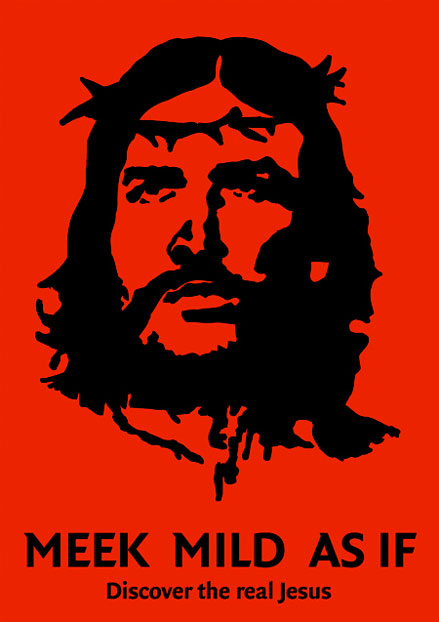Viva La Reformacion
we are allowed to say—and it doesn’t work anyhow.
The Sin of the Revolutionary Mind
by Tim Nichols
We worship in heaven, and we are unified with those who join us there in worship—including those believers in other nations, and those who died long before us. This unity surpasses any earthly tie, including ties of where you were born—or when.
The saints of every age and place are Our People, and we should hear the voices of those who have gone before us. They are sinners, and they can be wrong. But so can we, and so we listen to their wise counsel, and—as always—measure everything by Scripture. We cannot be revolutionaries, because we belong to a long line of people from whom we cannot separate, even though we may want to.
“Behold, I make all things new” is not something that we are allowed to say—and it doesn’t work anyhow. If we cannot remake our church, or our society, or our world at a stroke, through revolution, then what are we to do?
In Eden, the river that flows from the sanctuary waters the world. In the New Jerusalem, the water of life flows from the throne of God and of the Lamb, and the leaves of the trees beside it are for the healing of the nations. In between, Jesus says “He who believes in Me, as the Scriptures have said, out of his belly will flow rivers of living water.”
The life of the world flows from God through the sanctuary, through our worship; this is our first and most powerful agent of cultural change. Worship is a weapon by which we may battle God’s enemies and serve the people of the World at the same time. When we resort to carnal weapons, there is always collateral damage, but worship harms no one except those who insist on remaining enemies of God.
The charge therefore is this: Every change in your life, every difficulty, every new situation, should come first into your worship. Praise God, thank Him, ask for what you need. Situate your life in God-honoring heavenly worship before the throne of Grace. Then, having done that, pray that God’s will be done on earth as it is in heaven—and watch as God answers your prayers.
John commented:
Why do you think Jesus was executed with the connivance of the then in power ecclesiastical establishment in Palestine 2000 years ago?
Because his (then) revolutionary ideas were completely unacceptable, and a threat to the worldly power and privileges of the then ecclesiastical establishment.
Would you even recognize Jesus if he happened to appear unannounced at your local church? He most probably would not be dressed in a buttoned down Sunday suit (with tie in place).
Tim replied:
John,
Jesus was not a revolutionary. He was a reformer, calling God’s people back to what God’s Word had always taught, so they would be ready for the next step. There’s a difference.
It’s true that genuine reformers are often a threat to established power and privilege. But one can also be a threat to established power and privilege by being an anarchist, a thief, or a well-placed nincompoop. Some people are fools for the sake of Christ, but many more are just fools.
If Jesus showed up in my local church, I would recognize Him for the same reason that Nathaniel did — I already know Him. The suit and tie wouldn’t make a difference one way or the other. I’d ask you the same question a little differently — suppose Jesus did show up in your church, dressed up like a banker. Would you say to yourself, “That can’t be Jesus! Lookit what he’s wearing!”
_____________________________________________
On revolution versus reformation, see also Charity, Not Revolution and A True Culture War.



























May 16th, 2010 at 5:24 am
Would it be the case that Jesus was a reformer and a revolutionary? He was a reformer when he walked the earth, saying he did not come to destroy it but to save it. Then he was a revolutionary in AD 70 through his human pawns who destroyed the temple. He wore suit and tie to all the parties he attended on the earth and even at his crucifixion. In AD 70 he rolled up his sleeves and did the dirty work. (Mike, I just listened to an old sermon by Rich Bledsoe. In it he compares the plot of the revolutionaries in Fight Club with AD 70. Looks like you both had the same perspective on that movie-I read “Tyler rules the world”.)
May 16th, 2010 at 7:55 am
Hi Steven
Well, I guess the apostles did “turn the world upside down.” But it wasn’t overnight and it wasn’t by coercion or violence but by sacrifice.
And there is the factor that Jesus, as the last great prophet, was calling Jerusalem back to the Word of God to avoid the Covenant curses.
Also, as Jordan points out somewhere, the violence is more the case of God’s enemies losing trust in each other (ie. beast and harlot) and wiping each other out (a la Lock, Stock type movies) because God’s people simply continued to persevere in worship.
I do take your point. There are some similarities. But it’s more the process of yeast that brings about the transformation – even AD70. That was the bursting of the old wine skin.
Great to hear from you again. And what is Rich’s sermon called?
May 17th, 2010 at 5:09 am
The sermon is called “Forgiveness.” I don’t know where you could find it, I have it on tape. I actually have an extra copy if you’d like me to send you one. He just mentions Fight Club real quick when explaining debt. It’s a great sermon, though.